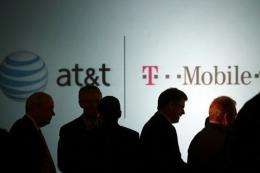Executives at AT&T attend a news conference in New York City in March 2011. AT&T is making a last-minute bid to save its $39-billion (29-billion-euro) purchase of T-Mobile from being slapped down by US regulators, the New York Times reported Tuesday.
Telecom giant AT&T is making a last-minute bid to save its $39-billion (29-billion-euro) purchase of T-Mobile from being slapped down by US regulators, the New York Times reported Tuesday.
AT&T is in talks with Leap Wireless to give the smaller firm some of the accounts and wireless spectrum of T-Mobile, a subsidiary of Germany's Deutsche Telekom, the Times reported, citing people involved in the negotiations.
Bringing Leap Wireless -- a second-tier but growing firm -- into the deal could deflect charges that the merger would constitute a monopoly and allow AT&T to gain much-needed wireless spectrum for next-generation services.
AT&T has said it needs T-Mobile's spectrum and has insisted that the merger between it and T-Mobile -- the second and fourth biggest US wireless providers, respectively -- would not harm competition.
But the deal has run into regulatory trouble, and the two firms said last week they were preparing for its possible collapse.
The US Federal Communications Commission (FCC) has voiced opposition to the deal, and the Justice Department filed a lawsuit to block it on August 31, saying it would harm competition.
The case is scheduled to go to trial in Washington on February 13.
FCC chairman Julius Genachowski had asked the other four commissioners on the body for AT&T's acquisition of T-Mobile to be subject to a hearing before an administrative law judge.
As a result, Deutsche Telekom said it and AT&T had withdrawn the pending applications with the FCC and would focus their efforts on first winning the approval of the Justice Department.
AT&T, T-Mobile, Sprint Nextel and Verizon Wireless provide more than 90 percent of the mobile wireless connections in the United States.
Verizon currently holds a 31-percent share of the US wireless subscriber market followed by AT&T with 27 percent, Sprint Nextel with 14 percent and T-Mobile with nine percent.
(c) 2011 AFP





















